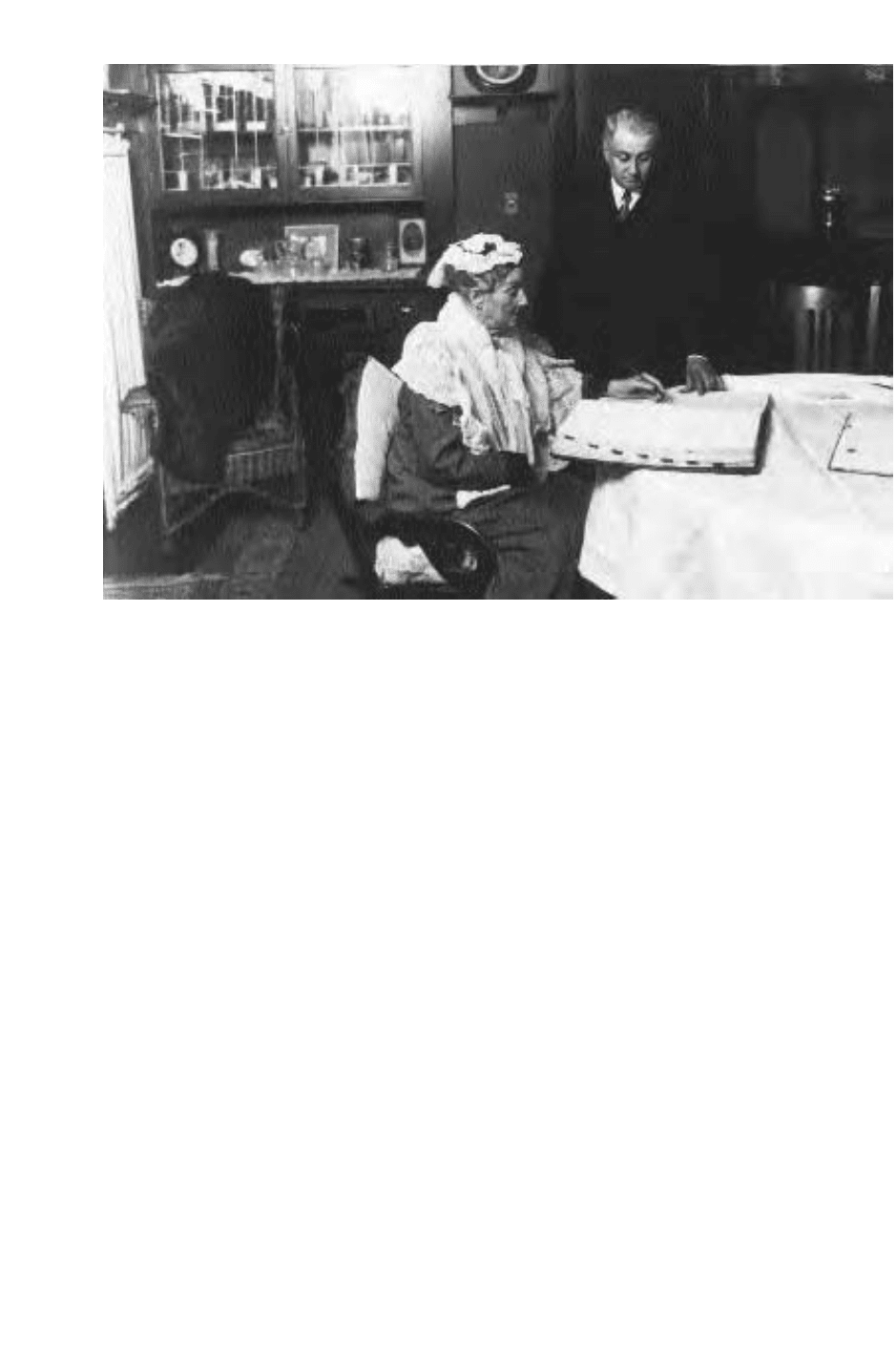Schenken Suzanne O’Dea. From Suffrage to the Senate: An Encyclopedia of American Women in Politics (2 Volumes)
Подождите немного. Документ загружается.


and women began to politicize matters that had previously been consid-
ered private, domestic violence became a focus of attention. In the 1970s,
the feminist movement publicized domestic violence and developed a
new perspective on it, framing it as a social problem. The movement to
end domestic violence began when a group in St. Paul, Minnesota, and
another in Tucson, Arizona, opened shelters in 1973. Over the next
twenty-five years, more than 1,400 hotlines, shelters, and safehouses were
established to serve victims of domestic violence. In 1990, however, more
than one-half of the counties in the United States had no programs for
battered women. To put the number of shelters in perspective, there are
nearly three times as many animal shelters in the United States as there are
shelters for battered women.
About 50 percent of domestic violence victims leave the abusive re-
lationship. Victims stay in a dangerous environment for a number of rea-
sons: inadequate space in shelters, loss of financial support, and fear of in-
creased violence or death. Some women stay in the relationships because
they have experienced indifference from legal authorities or found that
the criminal justice system was unable to protect them.
The battered women’s movement initially focused on providing
emergency services to women, as exemplified by the shelters. Feminists
broadened the agenda as they sought greater police protection for victims,
more effective responses from the justice system, and safety for victims
outside the shelters. Police generally viewed domestic violence as a family
disturbance and resisted arresting offenders because the public order was
not disrupted. Critics of the police insisted that their inaction implicitly
condoned the offender’s abuse. In some states, however, police did not
have the authority to arrest the offender unless they witnessed the vio-
lence, they had a warrant to arrest the offender, or the victim filed a com-
plaint, generally at the police station. Feminist Del Martin’s 1976 book
Battered Women documented police departments’ official policies of non-
intervention in domestic violence and provided activists with a guide for
changing public policies related to domestic violence.
Women began filing lawsuits in the 1980s, asserting that police had
failed to protect them and arguing that their rights under the equal pro-
tection clause of the Fourteenth Amendment had been violated. In one
case, a woman who had repeatedly called for police protection was as-
saulted and left paralyzed by her estranged husband. She sued the City of
Torrington, Connecticut, and was awarded $2.3 million. Other women in
similar circumstances followed her example, prompting several jurisdic-
tions to change their policies.
By 1980, forty-five states and the District of Columbia had special
civil legal provisions for temporary restraining orders for battered women
Domestic Violence 205

to help increase police responsiveness in domestic violence cases. More re-
visions followed in the 1990s, resulting in forty-eight states authorizing ar-
rests without warrants for domestic violence. Some states have laws for
mandatory arrests where probable cause suggests domestic violence. In
Iowa, which has some of the most rigorous domestic violence laws in the
nation, prosecutors’ discretion is limited in prosecuting domestic violence.
The federal government first became involved with domestic vio-
lence in 1979, when President Jimmy Carter established the Office of Do-
mestic Violence, but President Ronald Reagan closed it in 1981. Congress
passed the Family Violence Prevention and Services Act in 1984, provid-
ing matching funds for shelters and other services to assist victims of do-
mestic violence and for prevention programs. The Violence against
Women Act of 1994 provided new resources for combating domestic
abuse and other forms of violence against women.
See also Fourteenth Amendment; Martin, Del; National Coalition Against
Domestic Violence; Violence Against Women Act of 1994
References Congressional Quarterly Almanac, 98th Congress, 2nd Session...1984
(1985); Halsted, “Domestic Violence: Its Legal Definition” (1992);
www.abanet.org.
Dothard v. Rawlinson (1977)
In Dothard v. Rawlinson, decided in 1977, the U.S. Supreme Court applied
disparate impact to sex discrimination and considered bona fide occupa-
tional qualifications (BFOQ). Dianne Rawlinson had been denied a job as
a correctional counselor because she did not meet Alabama’s minimum
weight requirement of 120 pounds and a minimum height requirement.
In addition, the state required that guards working in maximum security
areas had to be male, claiming that gender was a BFOQ.
In the first part of the case, Rawlinson argued that the minimum
height and weight requirements had a different impact on women than on
men, that is, a disparate impact. The requirements excluded 41.3 percent
of women but only 1 percent of men, policies that Rawlinson claimed
were unlawful sex discrimination under Title VII of the Civil Rights Act of
1964. The Court agreed, writing:“It is impermissible under Title VII to re-
fuse to hire an individual woman or man on the basis of stereotyped char-
acteristics of the sexes.”
The second part of the case involved Alabama’s claim that denying
women jobs in certain maximum security areas was legal under the ex-
emptions granted in Title VII’s BFOQ section. The Court said that the
BFOQ exception should be “extremely narrow” but cited the environment
within Alabama’s prisons as a legitimate reason for excluding women as
guards. The Court said that having women guards posed a security prob-
206 Dothard v. Rawlinson

lem “directly linked to the sex of the prison guard” and concluded that be-
ing male was a BFOQ for correctional counselors in Alabama’s male max-
imum security prisons.
See also Civil Rights Act of 1964, Title VII; Employment Discrimination
References Dothard v. Rawlinson, 433 U.S. 321 (1977).
Douglas, Emily Taft (1899–1994)
Democrat Emily Douglas of Illinois served in the U.S. House of Repre-
sentatives from 3 January 1945 to 3 January 1947. Congresswoman Doug-
las was a recognized specialist in foreign affairs, a background she had
gained traveling with her family as a child and later with her husband.
With another member of Congress, she proposed placing the abolition of
atomic weaponry and international arms control under the auspices of
the United Nations. She introduced the Library Services Act to make
books more available to children in impoverished areas. When her hus-
band Paul Douglas was elected to the U.S. Senate in 1948, he helped pass
the measure. Defeated in her effort to win a second term, Douglas was ac-
tive in the Unitarian Church and began a career as an author.
Born in Chicago, Illinois, Douglas received a bachelor’s degree from
the University of Chicago in 1920. She studied at the American Academy
of Dramatic Arts and was an actress for several years. She later attended
graduate school, pursuing an interest in government and political science.
See also Congress, Women in; League of Women Voters; Sanger, Margaret
Louise Higgins
References H. W. Wilson, Current Biography 1945 (1945); Office of the
Historian, U.S. House of Representatives, Women in Congress, 1917–1990
(1991).
Douglas, Helen Mary Gahagan (1900–1980)
Democrat Helen Gahagan Douglas of California served in the U.S. House
of Representatives from 3 January 1945 to 3 January 1951. An opera singer
and stage and screen actress, Douglas became actively involved in Demo-
cratic Party politics as a result of her exposure to the plight of migrants in
California. She toured Farm Security Administration camps and raised
money for food and gifts for migrant children. President Franklin D. Roo-
sevelt recognized her efforts by appointing her to the National Advisory
Commission of the Works Progress Administration.
Elected Democratic national committeewoman for California in
1939, she became state party vice chair and chair of the state party’s
Women’s Division. Through her work in the party, she and her husband,
actor Melvyn Douglas, became friends of President Roosevelt. With the
Douglas, Helen Mary Gahagan 207

encouragement of Roosevelt and Hollywood celebrities, she ran for Con-
gress in 1944. Supported by the Congress of Industrial Organizations and
the International Ladies’ Garment Workers Union, she campaigned for
the rights of organized labor, full opportunity for private enterprise, tax-
ation based on ability to pay, prevention of unemployment and depres-
sion, and the renegotiation of government contracts. Food subsidies for
the poor, price controls, and protection for small business were other
campaign issues she supported.
Congresswoman Douglas supported New Deal and Fair Deal legisla-
tive packages. She introduced an antilynching bill and opposed the poll
tax. Attacks on African American men, particularly veterans, in the post-
war years prompted Douglas to research and write a pamphlet on African
American men’s military service, one of the earliest examinations of their
contributions to the country’s war efforts. The first white member of
Congress to hire African Americans for staff positions, she nominated
African American students who were admitted to West Point military
academy and helped desegregate Capitol dining rooms. In 1945, Douglas
introduced the Pay Equity Bill, eighteen years before Congress passed the
Equal Pay Act of 1963.
Douglas staunchly supported the Reclamation Act of 1902, a policy
that created irrigation systems for otherwise untillable land. The act lim-
ited landowners to 160 acres of irrigated land, a restriction that Douglas
208 Douglas, Helen Mary Gahagan
Representative Helen
Gahagan Douglas
(D-CA) spoke at the
World Youth Rally in
New York City, 1945
(Library of Congress)

believed protected farmers with smaller landholdings and helped protect
the environment. She was also adamant about protecting tidelands from
oil development. These two positions first led her to consider running for
the U.S. Senate in 1950. They also, however, placed her in direct opposi-
tion to large agricultural interests and oil developers.
Richard Nixon, who ran against Douglas in the 1950 Senate race, fa-
vored removing the 160-acre limit on the Reclamation Act and develop-
ing the oil resources in the tidelands, positions that brought him financial
support for his campaign. Nixon’s campaign strategy, however, did not fo-
cus on those issues. Instead, he accused Douglas of being soft on commu-
nism, labeled her “the pink lady,” distorted her voting record, and implied
that she was a hero of the Communist movement. The North Korean in-
vasion of South Korea fed the anti-Communist climate, particularly on
the West Coast, a region that was more sensitive to events in Asia than
other areas of the United States. The Nixon campaign created an atmo-
sphere of hate that included rocks being thrown at Douglas’s car, hecklers
disrupting her speeches, and threatening phone calls to her. Douglas failed
to take the attacks on her record seriously because she thought that the ac-
cusations were absurd. Nixon defeated her.
Born in Boonton, New Jersey, Helen Douglas studied theater from
1920 to 1922 at Barnard College.
See also Congress, Women in; Equal Pay Act of 1963
References Douglas, A Full Life (1982); New York Times, 5 January 1971; Office
of the Historian, U.S. House of Representatives, Women in Congress, 1917–1990
(1991); Schoenebaum, ed., Political Profiles: The Truman Years (1978).
Douglass, Frederick (1817–1895)
African American Frederick Douglass, born a slave in Tuckahoe, Mary-
land, became one of the most recognized leaders in the abolitionist move-
ment. After escaping from slavery in 1838, he made his first important an-
tislavery speech in 1841 and won the support of abolitionist leaders with
his compelling oratory. In 1846, a group of British women paid for his
emancipation and later raised money for him to purchase a printing press
and start his abolitionist newspaper, The North Star.
His support for women’s rights became apparent at the 1848 Seneca
Falls women’s rights convention hosted by Elizabeth Cady Stanton and
Lucretia Mott. At the convention, Douglass was the only man who sup-
ported Stanton’s suffrage resolution, and he helped gain the convention’s
approval of it. He further demonstrated his support for women’s rights by
publishing the Declaration of Sentiments and Resolutions, adopted at the
convention, in The North Star. He regularly attended women’s rights con-
ventions and was a featured speaker at the conventions for several years.
Douglass, Frederick 209

With their common interests, Douglass
and suffragists worked together to end
slavery and obtain universal suffrage for
more than two decades.
Following the Civil War, Douglass
disagreed with Stanton and Susan B. An-
thony over strategies for obtaining univer-
sal suffrage. When Congress introduced
the Fourteenth Amendment to guarantee
citizenship rights to former male slaves
and the Fifteenth Amendment did not in-
clude women, Anthony and Stanton were
outraged that women were excluded from
the measures. Douglass and others in-
sisted that it was the “Negro’s Hour” and
that women were not murdered for their
gender, whereas blacks were murdered for
their race. Stanton and Anthony vigor-
ously and persistently objected to the
amendments but ultimately failed, and they were ratified. In 1870, Doug-
lass called for a constitutional amendment enfranchising women.
In 1876, the schism that had grown between Douglass and Anthony
and Stanton was overcome when the two women invited him to speak to
the National Woman Suffrage Association. Douglass continued to support
woman suffrage, but his primary attention was focused on helping
African Americans.
See also Abolitionist Movement, Women in the; Anthony, Susan Brownell;
Fifteenth Amendment; Fourteenth Amendment; National Woman Suffrage
Association; Seneca Falls Convention; Stanton, Elizabeth Cady; Suffrage
References Foner, ed., Frederick Douglass on Women’s Rights (1992); McFeely,
Frederick Douglass (1991).
Duniway, Abigail Jane Scott (1834–1915)
Regarded as the single most important suffrage worker in Washington,
Oregon, and Idaho, newspaper publisher Abigail Duniway campaigned for
woman suffrage for almost forty years. Duniway became active in the suf-
frage movement in 1871 when she began publishing The New Northwest, a
newspaper dedicated to woman suffrage, and lecturing on the subject,
traveling through the area by riverboat and stagecoach and on horseback.
Duniway led efforts to found the Oregon Equal Suffrage Association
in 1873 and was instrumental in gaining the territorial legislature’s ap-
proval of woman suffrage measures. The electorate, however, defeated the
210 Duniway, Abigail Jane Scott
Frederick Douglass,
famous abolitionist
and ally to the suf-
frage movement,
ca. 1879 (Library
of Congress)

woman suffrage amendment in 1884, 1906, and 1910. The failure in 1906
was particularly difficult because Duniway had become the center of in-
tense conflicts over strategies for passing the amendment, and National
American Woman Suffrage Association leader Carrie Chapman Catt and
Oregon suffrage leaders faulted Duniway for the loss.
Oregon passed woman suffrage in 1912, but by that time Duniway’s
health had deteriorated, and her involvement in the campaign was min-
imal. She was, however, given a significant amount of credit for the
achievement, primarily out of respect for her years of dedication to
woman suffrage. After its passage, Duniway wrote the suffrage proclama-
tion, signed it with the governor, and became the state’s first registered
woman voter.
Born in Tazewell County, Illinois, Abigail Duniway immigrated to
Oregon with her family in 1852.
See also Catt, Carrie Clinton Lane Chapman; Congressional Union; Married
Women’s Property Acts; National American Woman Suffrage Association; Suf-
frage
References Moynihan, Rebel for Rights: Abigail Scott Duniway (1983).
Dunn, Jennifer (b. 1941)
Republican Jennifer Dunn of Washington entered the U.S. House of Rep-
resentatives on 3 January 1993. Dunn held the leadership position of
Dunn, Jennifer 211
Abigail Scott Duniway
was the first woman in
Oregon to register to
vote, 1912 (Courtesy:
Oregon Historical
Society)

vice chair of the House Republican Con-
ference in the 105th Congress (1997–
1999). She entered politics as a campaign
volunteer and became more active as her
children grew up. Chair of the Washing-
ton state Republican Party from 1981 to
1992, she chaired the association of Re-
publican state party chairs from 1988 to
1991. Congresswoman Dunn has criti-
cized the Internal Revenue Service’s prac-
tices, characterized the agency as overzeal-
ous, and accused it of trampling on
citizens’ rights. Vice chair of the Republi-
can Conference in the 105th Congress
(1997–1999), the fifth-highest-ranking
position in the House leadership, she has
sought to close the gender gap by explain-
ing the ways that Republican Party poli-
cies affect women. She helped develop the welfare reform package in 1996,
seeks tax relief for the middle class, and works to help small and family-
owned businesses.
Born in Seattle, Washington, Dunn attended Stanford University in
1959 and the University of Washington from 1960 to 1962, and earned her
bachelor of arts degree in English literature from Stanford University in
1963. Following graduation, she was a systems engineer for IBM from
1964 to 1969. She worked for the King County Department of Assess-
ments from 1978 to 1980.
See also Congress, Women in; Gender Gap; Welfare
References Congressional Quarterly, Politics in America 1994 (1993), Politics in
America 1998 (1997); www.house.gov/dunn/bio.htm.
Dworkin, Andrea (b. 1946)
Feminist lecturer and author Andrea Dworkin has worked with lawyer
Catharine MacKinnon to enact laws that classify pornography as a form
of sex discrimination. They have drafted legislation that has served as a
model for measures passed in several cities, but all of them were vetoed or
rejected by courts. The only measure that has survived court review was
enacted in Canada.
Dworkin’s first book, Woman Hating: A Radical Look at Sexuality
(1974), explored men’s dominance of women in Western and Eastern cul-
tures. Its generalizations about men as violent and oppressive created con-
troversies both inside and outside the feminist movement. In her book
212 Dworkin, Andrea
Representative Jennifer
Dunn (R-WA), with
Representative Steve
Largent (R-OK) ran for
House majority leader
but was defeated, 1998
(Associated Press AP)

Pornography: Men Possessing Women (1981), she argued that the violence
portrayed in pornography leads men to violence against women. The con-
troversy surrounding Dworkin’s stand on pornography centers on the
limitations that it would place on free speech rights. Among Dworkin’s
other works are Pornography Is a Civil Rights Issue for Women (1986) and
the novel Ice and Fire (1986).
Born in Camden, New Jersey, Dworkin earned her bachelor’s degree
from Bennington College in 1968.
See also MacKinnon, Catharine Alice; Pornography
References H. W. Wilson, Current Biography Yearbook 1994 (1994).
Dwyer, Florence Price (1902–1976)
Republican Florence Dwyer of New Jersey served in the U.S. House of
Representatives from 3 January 1957 to 3 January 1973. Dwyer’s mother
encouraged her to become interested in politics in 1920, the first year of
woman suffrage, and Dwyer became active in local and county Republi-
can organizations, served as legislative chair for Business and Professional
Women/USA, and worked to get women appointed to government posi-
tions. She also lobbied the state legislature for garden clubs and parent-
teacher groups.
Secretary to the majority leader of the New Jersey assembly in 1947,
she served in the New Jersey House of Representatives from 1950 to 1956.
While there, she successfully worked for a measure for equal pay for
women and sponsored the first statewide minimum salary schedule for
teachers.
In Congress, Dwyer supported consumer rights issues, working with
Leonor Sullivan on the Fair Credit Protection Act, an attempt to remove
discrimination in lending policies, and was a chief sponsor of the measure
that created the Consumer Protection Agency. A leader in the passage of
the Equal Pay Act of 1963, Dwyer challenged several provisions in it that
she believed subverted the law’s intent. She also believed that the bill had
too many exclusions because domestic workers, retail workers, and others
were not covered by the law. One of the Republican congresswomen who
met with President Richard Nixon in 1969, she tried to convince him to
help end discrimination against women and lobbied him to establish the
Office of Women’s Rights and Responsibilities within the Office of the
President. Instead, Nixon created a task force, which produced a report
that he only reluctantly released because he found it too controversial. She
retired from her seat in 1973.
Born in Reading, Pennsylvania, Dwyer attended the University of
Toledo and special classes at Rutgers Law School.
Dwyer, Florence Price 213

See also Congress, Women in; Equal Pay Act of 1963; Equal Rights
Amendment; State Legislatures, Women in; Sullivan, Leonor Kretzer
References New York Times, 1 March 1976; Office of the Historian, U.S. House
of Representatives, Women in Congress, 1917–1990 (1991); Tomlinson, “Making
Their Way: A Study of New Jersey Congresswomen, 1924–1994” (1996).
214 Dwyer, Florence Price
